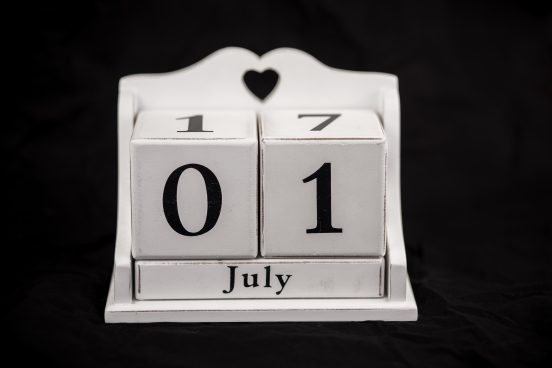“Time, once passive, is now aggressive,” says Simon Garfield, author of the book Timekeepers: How the World Became Obsessed with Time, “it dominates our lives in the ways that the earliest clockmakers would have surely found unbearable”. I think it’s fair to say that most of us these days have become slaves to the watch and calendar. This, is in direct contrast to centuries ago when “before writing was deeply interiorized by print, people did not feel themselves situated every moment of their lives in abstract computed time of any sort” (Ong, p.96).
In his book “From Memory to Written Record”, Clancy (1979) emphasizes the unimportance of dates and observing time, so much so that early charters conveying land in England were originally not even dated (pp.231, 236-241) suggesting that the most likely reason for this was that “dating required the scribe to express an opinion about his place in time” (p.238), which demanded that he chose a point of reference. But, as Ong states (p.96) what point of reference was there to choose? “Was he to locate this document by reference to the creation of the world? To the Crucifixion? To the birth of Christ? Popes dated documents this way, from Christ’s birth, but was it presumptuous to date a secular document as popes dated theirs?” After all, even though the Julian Calendar was used by some, there weren’t any calendars, clocks or watches for the average person to refer to in 12th Century England.
For me, having no concept of date or time seems unfathomable. We live in a period in history (here, I made a conscious effort not to use the word “time”!) where we have become so obsessed with keeping to deadlines, the word “time” is now the most commonly used noun in the English language according to the Oxford English Dictionary. “Year” and “day” are also in the top five and phrases such as “last time”, “reading time” and “quality time” occur frequently in common speech. Yet, as Ong writes, it’s unlikely that most people living in medieval or Renaissance western Europe would have been aware of the number of the current calendar year or even know (or to that matter, care) what calendar year they had been born in. With no newspapers or other currently dated material impinging on peoples’ consciousness, he argues that there would have been know point in even knowing the date.
Of course, now we have the Gregorian Calendar, the most widely used civil calendar in the world. We know when our birthdays are, we look forward to them and other special occasions by counting down the days and months, we even have a plethora of apps to help us with the countdown, most of us wear watches or use our devices for referring to the time and date, and I for one, feel totally lost if I don’t know what day it is or what the date is! It’s ironic that the ultimate goal of most of us is to make time our servant rather than our master, by managing time so that we can all … do more things ….
References:
Clanchy, M. T. (1979) From memory to written record: England, 1066–1307. Cambridge, Mass.: Harvard University Press.
McKie, R. (2016, October 3). Timekeepers: How the world became obsessed with time by Simon Garfield – review. The Guardian. Retrieved from https://www.theguardian.com/books/2016/oct/03/timekeepers-how-the-world-became-obsessed-with-time-review-simon-garfield
Ong, Walter. (1982). Orality and literacy: The technologizing of the word. London: Methuen




scott pike
July 5, 2018 — 8:09 pm
Hi Jo,
Thanks for your contribution. It certainly gave me much to think about, and while my comment isn’t rooted particularly deep in extraneous research, I can’t help but chime in with the observation that, in many ways, technology has done much to erode our sense of selves situated within a particular period of time. Gone are the expectations that time has much relevance with how we relate to the world. The information we now send and receive is exchanged with the expectation that it will be done so nearly instantaneously, and with me, it is only with great effort that I fight the impulse and expectation that I engage with the world in this manner. I need to consciously force myself not to respond to that text, or email, just because I can.
Is it rather that we are becoming slaves to modernity, and the collective expectations that our society is constructing as a response to transformative effects of technology? According to Wikipedia, evidence of the first lending library wasn’t until 1586. Does this mean to suggest that the notion of a portable text did not exist in the period from late antiquity until then? Certainly this is a value that our society esteems now, but it looks like it wasn’t always the case.
If I have learned anything from this module, it is the profound effect that language and technology have on our world. It is some pretty powerful Doublethink to be able to understand how text technology makes us both aware and unaware of the time we are situated in.
References:
Bolter, Jay David. (2001). Writing space: Computers, hypertext, and the remediation of print [2nd edition]. Mahwah, NJ: Lawrence Erlbaum.
Ong, Walter. (1982.) Orality and Literacy: The technologizing of the word. London: Methuen.
Wikipedia contributors. (2018, January 20). Lending library. In Wikipedia, The Free Encyclopedia. Retrieved03:07,July6,2018,from https://en.wikipedia.org/w/index.php?title=Lending_library&oldid=821477122
natallia kuzmich
July 5, 2018 — 9:39 pm
Thanks a lot for your post, Jo! I enjoyed it a lot!
Thinking about the time, I immediately related it (as funny as it was) to my work!
Having taught all over the world and teaching newcomers to Canada here in Canada, I constantly struggle with accepting the different notions of ‘time’, in different variations, of course! Deadlines, being on time, you name it!
I think some of the students I am teaching who come from ‘oral’ cultures, strongly resist the process of ‘modernization’. I don’t want to be dramatic or argumentative, by any means, but it challenges my own notion of time! They are so happy without the stressful reality of our present world full of deadlines!
They don’t want to be slaves, why should I?
I know, some might not agree with me, but I almost started questioning my own lifestyle!
Thanks again for your post,
Natallia
wendyl
July 6, 2018 — 5:38 am
Hi Jo, Your post reminded me of Mitch Albom’s novel The Time Keeper: “Man alone measures time. Man alone chimes the hour. And, because of this, man alone suffers a paralyzing fear that no other creature endures. A fear of time running out.” This inspection of time has Father Time, the inventor of it, punished to an eternity without its end.
It is interesting the connections you point out in your post between time and print. I also think it is interesting how this might apply to our new concept of time and the digital age, where the need for immediacy sometimes takes precedence over prudence and contemplation. Do you think this urgency will affect our ability to focus, and learn? Certain the rise of mindfulness meditation would suggest that it is important to sit with time in the present. This was never a pressing issue in the past. Owning the present time is important to our well being today and is perhaps a coping mechanism for the immediacy or our world.
If print gave us ownership of our words as Ong suggests, perhaps the intertextual nature of hypermedia is forcing us to relinquish that ownership. Is it even important to know something? Certainly, you hear in the news that the minutes in a day or a week that the general population reads is diminishing, but are we defining reading in the correct way? Does hypermedia encourage or discourage reading in a sustained way? Is sustained reading even an important skill in this brave new world? There isn’t one right and true way to demonstrate understanding anymore.
kamille brodber
July 6, 2018 — 9:46 am
Hi Jo,
I found your piece quite intriguing and as I read it I thought about a conversation I had with my husband the other day about my being so dependent on having a deadline to get motivated to do certain tasks. Sometimes I wonder if the pressure of the deadline takes away the creative joy I would have in getting some things done or is it that these tasks would never get completed. The looming deadline has almost become that push or extrinsic motivator I need to get moving. Does it have to be that way?
I also thought about what you said about not being able to imagine life where we didn’t keep track of dates and times. All the devices we use – laptops, cellphones, smartwatches, etc. – are always, in one way or another, informing us of the date and time. I have been of the belief for some time now that time is speeding up. I know that this more a matter of perception and I now think that this perception is based on this preoccupation with time. My typical day is always scheduled in blocks of 1 – 2-hour segments and everything I seem to do has a time limit to it. There are very few things that I do in my typical day that doesn’t seem to have a time constraint associated with it. It therefore leaves me with the feeling that there is not enough time to do everything and thus time must be speeding up.
I agree with you, that while the aim is to make time do our bidding the situation is reversed, and I wonder if we would be more creative and less stressed if we were not so date and time conscious. Then again, having lived with the situation being like this for so long it seems hard to change. On the few days when I am not living this constant schedule I feel somewhat lost because the shift in my normal routine becomes unnerving. It makes one wonder what life would be like in today’s world if we weren’t so time bound.
adam sheard
July 6, 2018 — 5:53 pm
Hello Jo!
I really enjoyed reading this article! The chronological evolution of our society is something that deeply fascinates me, particularly in terms of how our time seems to get more and more limited each and every day. One concept that I find strikes a good balance with our hastening world is that of the ‘slow’ revolution. In Carl Honore’s book In Praise of Slow (2004) he talks about how while the slow revolution started in force as a response to fast food in Italy, it has expanded to include a lot of the concepts surrounding text that we are discussing in this class!
One of the ways these references to “speed,” be it slow or fast, jives really well with the theme of our course is the progressive technological “advancement” of text and its epistemologies, ontologies, and pedagogies. We discussed in this module a bit about how new forms of text are often met with resistance by people who are already accustomed to the “old way,” and that each “improvement” in textual technologies inevitably brings about more efficiency– in other words, it increases the speed at which text ebbs and flows within our culture. It would appear that in the eyes of Ong (1982), Bolter (2001), and many of the other readings that we read both within and outside of our curriculum that speeding up is a “natural” process and if anything should be embraced by everyone. I, however, disagree with this! Just as the slow-food movement has shown that faster isn’t always better, Seeber and Berg (2016) in their book Slow Professor have shown that speed is also detrimental to academia. These days if you want to become a tenured university professor you are required to publish a certain amount of papers each year. As a result a lot of professors don’t have time to meet with their students or even enjoy studying their topic at their own leisure. It is almost as if the words of Socrates in the Phaedrus have come true, where writing text and each evolutionary iteration that has followed has further and further isolated speakers from the society surrounding them!
Is this really true? Does… the evolution of texts = the speeding up of communication = the ultimate isolation of humankind and death of what we used to refer to as dialogue? Perhaps the introduction of the internet might offer some more dialectical pathways down which we might walk, but then why is everyone feeling more and more alone as suggested by Robert Putnam (2000) and Sherry Turkle (2012)?
Berg, M., & Seeber, B. K. (2017). The slow professor: Challenging the culture of speed in the academy. Toronto: University of Toronto Press.
Bolter, Jay David. (2001). Writing space: Computers, hypertext, and the remediation of print [2nd edition]. Mahwah, NJ: Lawrence Erlbaum.
Ong, Walter. (1982.) Orality and literacy: The technologizing of the word. London: Methuen.
Putnam, R. D. (2007). Bowling alone: The collapse and revival of American community. New York, NY: Simon & Schuster.
Turkle, S. (2012). Connected, but alone? Retrieved from https://www.ted.com/talks/sherry_turkle_alone_together
joanna cassie
July 11, 2018 — 10:41 am
Hi Jo,
Thanks for a terrific post that engaged so many other posts!
One thing I wanted to mention first is that I was surprised to learn that “reading time” is still a popular expression, let alone one of the most popular. That is heartening, because among other things reading is such a great way to lose track of time, something I long to do more of.
Like other responses here I also feel the sense of time speeding up. But it’s not – I think if one leaves urban society for a (long) while, the sense of speeding up would be a least diminished; and the more so the further away you go. Also, I think the speeding up is due to two things: 1) having to learn and adapt every day is something our ancestors did not have to do; I recall in the 80s the age of thirty was thought of as “old” and generally when people stopped learning. For a more solid reference than my own opinion, continuing medical education didn’t truly take hold until the 80s (in the decades prior it was funded by pharmaceutical companies), and before the second half of the 20c, you knew what you knew when you left medical school and used that same knowledge for your entire career! 2) The second thing is that with knowing more comes the expectation of producing more. Yes, and it is that capitalist mode of production that perhaps a false sense of meaning to our lives. Here is some sage advice I once received from someone with an esteemed, highly productive career: “Learn early (ie. as far before retirement as you can) how to be unproductive. Detach productivity as a measure of your self-worth, and find another capacity for self-acceptance. No matter how productive you are in your career, learning how to let that go early on will help you greatly in the transition to retirement life.”